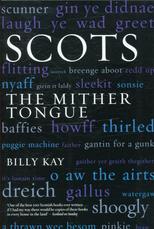 Scots is a national language (not a debased dialect) which has produced a rich and brilliant literary tradition. It was preceded in Scotland by the pan-European Celtic language in the 5th century, of which Gaelic is the modern descendant. Please buy the book here.
Scots is a national language (not a debased dialect) which has produced a rich and brilliant literary tradition. It was preceded in Scotland by the pan-European Celtic language in the 5th century, of which Gaelic is the modern descendant. Please buy the book here.
The Scots language developed during the Middle English period as a distinct entity, descended from Northumbrian Inglis, which dates to the 7th century arrival of the Germanic Anglo-Saxons. Scots is one of the ancient varieties of English, yet it has its own distinct dialects. It contains words from Latin (dux, jannie, dominie), Pictish (pit, as in Pitlochry), Gaelic (glen, ben, strath, sonsie), Danish (brig, lowp, skirl, flit, graith, lug), Norwegian (byre, kirk), the Low Countries (pinkie, scone, gowf, howff, hunkers, redd) and France (provost, baillie, vennel, gigot, douce, mavis, fash). The grammar of Scots differs from English (I says tae him, I gaed hame, thir apples wes guid). The Northumbrian Inglis started to lose many of its old words (dicht, reik, greet, sweir) under the influence of the East Midland dialect of Mercia, and the Scots started to refer to their language as Scots.
Gaelic was the language of court, state, church, literature and scholarship in the 11th century.
King David I started the move from Gaelic to Scots in the 12th century as power moved from the west to Dunfermline, Stirling and Edinburgh.
By 1424, Scots replaced Latin for recording the laws of the Scottish Parliament.
The Golden Age of Scots literature was in the 15th century – Henryson, Dunbar, Douglas, Lyndsay – to be followed by Burns in the 18th century and McDiarmid and Lewis Grassic Gibbon in the 20th century.
Scots was the language of King James VI, who united the Kingdoms in 1603.
Since 1707, cultural colonialism has tried to marginalise and eradicate the Scots tongue.
Guid Scots is much more than bad English. Scots is to English as Castilian Spanish is to Catalan Aragonese, or Norwegian is to Danish. To lose the Scots tongue would be to become strangers to the cultural background that made us what we are. Scots are different, multi-lingual – and the Scots language is an essential part of our culture.
The National has printed a full edition in Scots!
If we want a muckle pairt o oor story tae survive, it will
Jings or whit! A spang-new column in the Mither Tongue
You’ll enjoy a tour of the variety of Scots accents in The Rumour by Andy Stewart.
Yes Edinburgh West has a website, Facebook, Twitter, National Yes Registry and a Library of topics on Scottish Politics, including Education.
